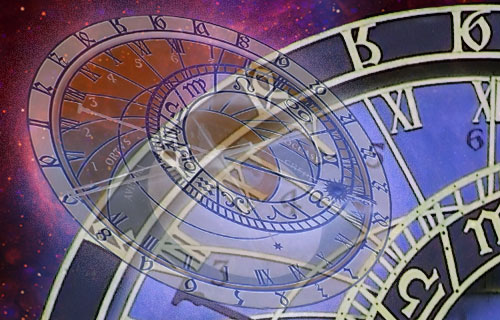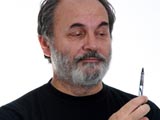The Year XIV6013
by Tarık Günersel / March 29, 2013 / No comments
61st Century Man: Our time in relation to all time.

Image created by Sampsonia Way. Via: Smithsonian Institution and simpologist. Creative Commons.
“What year are we in?” I asked the bright Creative Writing students at Sheboygan North High School in Wisconsin on March 13, a whole 42 years after my graduation as an AFS student. The reply was “naturally” 2013.

- Life is words in action, literature is action in words.
Humans are about to destroy their spaceship Earth. Some of them are aware of this and they try to change the course of events. Will they succeed? Will more humans be alarmed and do something?
Literature is vital and translators are messengers of world peace.
Though I shall focus on the literary scene in Turkey and its problems regarding freedom of expression, I shall not omit the other parts of our planet. Today local is global and vice versa. 
- Tarık Günersel is a poet, playwright, aphorist, librettist and short story writer. He is the president of PEN Turkey and an ex-member of the PEN International Board. He studied English Literature at Istanbul University. A self-exile after the military coup in 1980, he spent four years in Saudi Arabia with his wife Füsun and their daughter Barış, teaching English. A dramaturg at Istanbul City Theater since 1991, he has acted on stage and screen and directed some of his plays. He proposed World Poetry Day in 1997 which was accepted by PEN International and declared by UNESCO as the 21st of March. His translations into Turkish include works by Samuel Beckett, Vaclav Havel and Arthur Miller. His works include The Nightmare of a Labyrinth (mosaic of poems and stories), and How’s your slavery goin’? His Oluşmak (To Become), a “life guide for myself,” includes ideas from world wisdom of the past four millennia.
“My question was wrong,” I said. “The Islamic year is different, as is the Jewish year. There is also the traditional Chinese one. So the correct question is ‘What years are we in?’”
The question in the singular form is acceptable, due to practicality in communication. But we are so used to practicalities that we tend to disregard the wide spectrum of the actual world we live in. On a daily and “small” scale this may cause no problems, but if we wish to imagine the variety of actualities on our planet as simultaneously as we can, trying to see the biggest picture possible, then such practicalities may limit our vision.
I showed my co-travelers (as I called the students, as we all travel on the same planet, friends and foes alike) the cover of the new issue of Scientific American: “The Evolution of Creativity.” The article refers to the 6 million years of “our” history.
In order to reach a better comprehension of the human journey, I propose transcending the God-related labeling of turning points in history.
Saying “Before Common Era” instead of “Before Christ” does not solve the problem. “BCE” is still a derivative of the beliefs related to Christian mythology.
So, in honor of human creativity and labor, I have chosen the invention of writing as the turning point in history. To do this we simply add 4000 to 2013. Thus, we are in the year
6013 AW
AW: After the invention of Writing. I’m aware that there is a difference of a few centuries, but let’s be practical.
This universe is 13.7 billion years old—almost 14—so we could add XIV to this number and see that we are in the year XIV6013. It’s easy to write, but how should we say it? Fourteen billion sixty thirteen?
And then the next question comes: “What was before the universe?” I’m aware of the discussions about the validity of this question. However, my present preference is this: If we accept nature and “this universe” (rather than “the universe”) as different entities, then it is possible to say that there was nature, about which we—at least I—know nothing today.
Consequently, we can use a question mark to signify the pre-beginning of this universe and add “6m” in reference to our known history of 6 million years:
?XIV6m6013
I wrote this figure on the board, amusing the students, their teacher Lori Telschow, The Sheboygan Press journalist Kali Thiel, and my friend Ron Stein.
But while the date above is respectful to science, it is a bit too long for daily usage. Using XIV6013 is easier. The most practical way is 6013.
So, with this calculation, Shakespeare lived in the 56th and 57th centuries, Marx in the 59th century. WWI began in 5914, and the American astronaut Neil Armstrong became the first human on the Moon in 5969.
The next step is an introductory world history book, which I hope to prepare by 6014.
The 61st century is promising.




